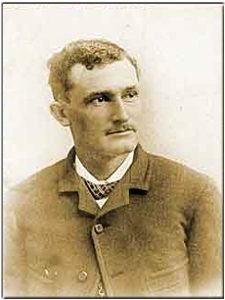John R. Hughes
1855 - 1947

John R. Hughes, Texas Ranger
John Reynolds Hughes was born 11 February 1855 in Illinois. The family later moved to Kansas. At the age of fourteen Hughes left home and eventually made his way into Indian Territory. He lived among the Choctaw and Osage Indians for about four years and then lived with the Comanche in the Fort Sill area. There he worked as a trader and for a short time as a trail driver. Hughes' right arm was partially disabled during a fight, but he quickly learned to shoot with his left hand. Hughes moved to Texas, buying a farm near Liberty Hill where he raised horses.
In 1886 several horses were stolen from his and neighboring ranches. Hughes trailed the men for several months, killing some of them and capturing the rest. He returned the stolen horses to their owners. His feat gained the attention of not only the outlaws but also the Texas Rangers.
In July 1887, Hughes helped Texas Ranger Ira Aten track down and kill escaped murderer Judd Roberts. In August 1887, Hughes was persuaded to join the Texas Rangers. He had risen to the rank of sergeant in Company D Frontier Battalion by 1893. When their Captain, Frank Jones, was killed in June 1893, Hughes was promoted to captain of Company D. For most of his career, Hughes served along the border of southwest Texas.
In 1901, when the Frontier Battalion was abolished and the State Rangers created, John Hughes was selected as one of the four Captains of the new companies. He served until his retirement in 1915. During the 28 years he was a Ranger, Hughes dealt with a wide variety of cases including thefts at the Shafter silver mines, cattle rustlers, horse thieves, murders and even the Maher-Fitzsimmons prize fight. He was known as "the border boss."
In his book Trails and Trials of a Texas Ranger, W. W. Sterling described Captain Hughes in this way: "John R. Hughes had every requisite of a great captain: initiative, courage, intelligence and judgment. He loved the Service. One of the axioms he used in enlisting his men. . . was 'Nerve without judgment is dangerous, and has no place in the Ranger Service.' "
John Hughes never married. He spent his retirement years prospecting and traveling by automobile. He was also involved in the banking industry, becoming chairman of the board and largest stockholder of the Citizens Industrial Bank of Austin, but he continued to live in El Paso.
In 1940 John R. Hughes received the Certificate of Valor, an award commemorating the the bravery of peace officers. He moved to Austin to live with a niece, and on 3 June 1947, after living through the end of the frontier and two world wars he committed suicide at the age of 92. He was buried in the State Cemetery in Austin, Texas.
Suggestions for further reading:
- Jack Martin, Border Boss, San Antonio: Naylor, 1942
- W. W. Sterling, Trails and Trials of a Texas Ranger, Norman: University of Oklahoma Press, 1959
- Bill O'Neal, Encyclopedia of Western Gunfighters, Norman: University of Oklahoma Press, 1979
- Frederick Wilkins, The Law Comes to Texas, Austin: State House Press, 1999
- Walter Prescott Webb, The Texas Rangers, Austin: University Of Texas Press, 1935
- Darren L. Ivey, The Ranger Ideal Volume 2: Texas Rangers in the Hall of Fame, 1874 – 1930, Denton: UNT Press, 2018
- Vertical files, Center for American History, University of Texas, Austin, Texas
- Vertical files, Texas Ranger Research Center, Texas Ranger Hall of Fame and Museum, Waco, Texas
